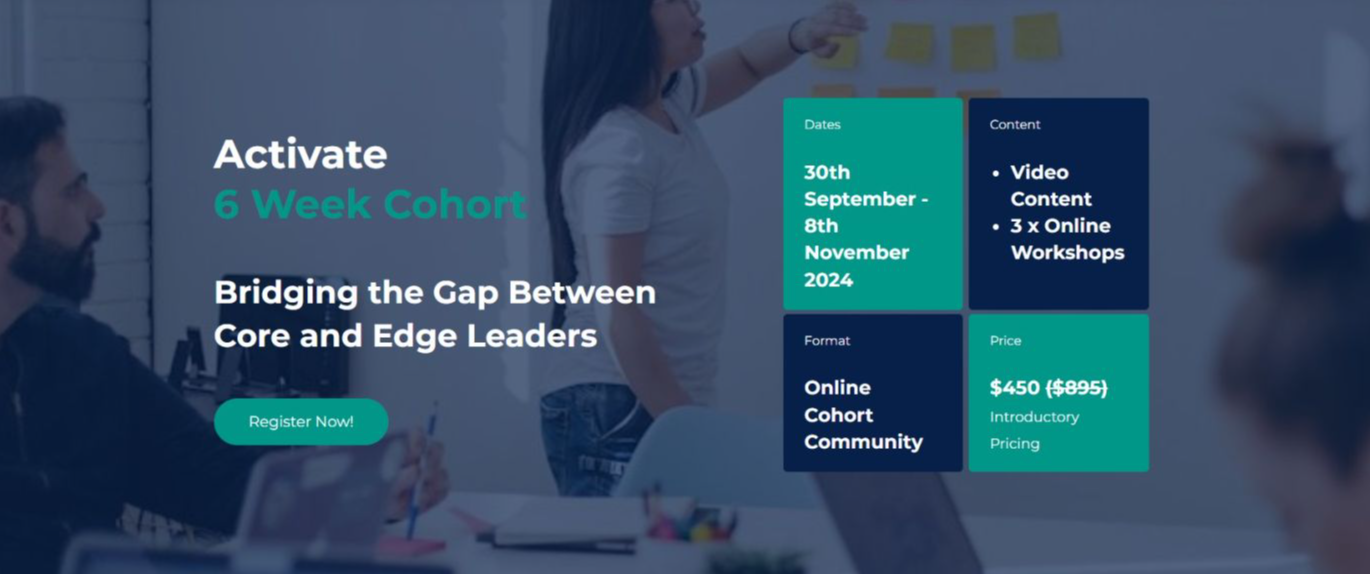When two leaders decide they want to work together, the initial stages are a lot like dating.

When two leaders decide they want to work together, the initial stages are a lot like dating.
Take this example: a Core Organisation Leader is looking for a start-up Edge Leader to expand what they do. This connection between the two is a relationship. And, like all new relationships, it takes time to develop, time to understand if you both want the same things, and time to know if you both want to be in a relationship.
Dating is especially important between a Core Leader and an Edge Leader. Too often an Edge Leader is just so happy to have a Core Leader want to support them that they accept anything. They don’t take the time to work through if the relationship is actually good for them and what they have a vision to do. The same can happen for a Core Leader, especially when they see a need in the community that they are not addressing; they, too, may jump into a relationship with the first Edge Leader they come across, because they are just happy to see something new.
A period of 'dating' is encouraged.
Here are my top 6 questions to ask yourself as you begin ‘dating’ a new leader in your life. It doesn’t matter if you are a Core or Edge leader; your relationship should be built around these questions:
1. Do you obsess about the same things? Do you share passions and compulsions? Or are you having a hard time working out what they are passionate about? My tip: make sure you know what you are passionate about, what you want to see happen, and what community you are pursuing. When you know this, see if it lines up with the other leader. You don’t need to be best buddies on the first date, but you do want to share some passions and compulsions, especially since a new relationship will take some energy over a long period of time.
2. Do they want outcomes too fast? Are they actually wanting to develop something new, or are they just wanting to see something happen? Do they want firm outcomes too quickly? My tip: use the “probation period” both ways. Often the Core Leader insists on a probation period, but my tip is for both leaders to insist on a probation period. Take your time. Don’t rush into a multi-year commitment with firm outcomes too quickly. It is okay to date for a while and see where it goes, then firm up the relationship when things get serious.
3. Can you trust them? Or, are they doing things that are raising “red flags” for you? My tip: trust takes time to develop. Don’t rush in. Allow trust to build. Pay attention to how much you trust or don’t trust. If you are continually making excuses for the other leader breaking trust, and they aren’t willing to discuss it, I encourage you to be very careful. Trust is everything, even in a formal relationship like the one between a Core and Edge Leader.
4. Are they prepared to share some risk with you? There is always risk in a new relationship. This is connected to trust, but the focus here is another question: is one leader taking all the risk and the other just being risky? If the Core Leader is taking all the risk with their resources–people, property and finance, etc.–then there is a legitimate question to be asked about how committed the Edge Leader is. If the Edge Leader is taking all the risk, then perhaps you need to ask why you want the relationship in the first place. My tip: Be careful with risk. The best approach is shared risk. In this relationship, there will always be more risk for the Edge Leader. But the Core Leader can risk some of their resources, risking the whole organisation. The danger is when the only risk is for the Edge Leader.
5. How are you demonstrating commitment to each other? Too often in this type of relationship, one party is committed while the other is disinterested. If an Edge Leader is trying to organise a meeting with a Core Leader, but they are always too busy, then you need to question their commitment. If the Edge Leader is always busy when the Core Leader wants to discuss an aspect of what is being discussed, then you should ask some questions. My tip: You need a healthy relationship for this to thrive. You need to expect to spend time together, to communicate on a regular basis, and to share stories with each other of how each of you is going. If only one of you is committed, is it a relationship? One date, many years ago, is not a relationship - even if you have made the relationship formal.
6. Are they disciplined in what they do? A common mistake here is that the Core Leader needs to be the only one who is disciplined while an Edge Leader is allowed to be chaotic and lack discipline because it “comes with the territory” of trying something new. Both have to be disciplined. My tip: a lack of discipline is the quickest way to blow up a relationship. Date for a while, and watch how discipled they are. Being undisciplined with money, time, people, and leaders is the surest way to get nothing done or make things worse. But, if both can be disciplined, then the sky's the limit with this type of a relationship.
One final thought: Dating is not a relationship. Pursue a long term relationship with the other leader. And don’t assume your relationship will happen naturally. It can, but most relationships take more work than just a good first date. If you can start well, and allow your relationship to develop, you will give yourself the best chance to thrive for many years to come.
Activate - Short Cohort

Subscribe to our newsletter
Connect with us
Who we are
Get in touch
-
Adelaide, SA, Australia
-
admin@projectnexus.org.au

